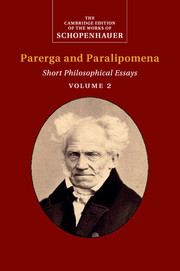Book contents
- Frontmatter
- Contents
- General editor's preface
- Editorial notes and references
- Introduction
- Notes on text and translation
- Chronology
- Bibliography
- PARERGA AND PARALIPOMENA, VOLUME 2
- Contents
- Sporadic yet systematically ordered thoughts on multifarious topics
- Chapter 1 On philosophy and its method
- Chapter 2 On logic and dialectic
- Chapter 3 Some thoughts concerning the intellect in general and in every respect
- Chapter 4 Some observations on the antithesis of the thing in itself and appearance
- Chapter 5 Some words on pantheism
- Chapter 6 On philosophy and natural science
- Chapter 7 On colour theory
- Chapter 8 On ethics
- Chapter 9 On jurisprudence and politics
- Chapter 10 On the doctrine of the indestructibility of our true essence by death
- Chapter 11 Additional remarks on the doctrine of the nothingness of existence
- Chapter 12 Additional remarks on the doctrine of the suffering of the world
- Chapter 13 On suicide
- Chapter 14 Additional remarks on the doctrine of the affirmation and negation of the will to life
- Chapter 15 On religion
- Chapter 16 Some remarks on Sanskrit literature
- Chapter 17 Some archaeological observations
- Chapter 18 Some mythological observations
- Chapter 19 On the metaphysics of the beautiful and aesthetics
- Chapter 20 On judgement, criticism, approbation and fame
- Chapter 21 On learning and the learned
- Chapter 22 Thinking for oneself
- Chapter 23 On writing and style
- Chapter 24 On reading and books
- Chapter 25 On language and words
- Chapter 26 Psychological remarks
- Chapter 27 On women
- Chapter 28 On education
- Chapter 29 On physiognomy
- Chapter 30 On noise and sounds
- Chapter 31 Similes, parables and fables
- Some verses
- Versions of Schopenhauer's text
- Glossary of names
- Index
Chapter 27 - On women
from PARERGA AND PARALIPOMENA, VOLUME 2
Published online by Cambridge University Press: 05 November 2015
- Frontmatter
- Contents
- General editor's preface
- Editorial notes and references
- Introduction
- Notes on text and translation
- Chronology
- Bibliography
- PARERGA AND PARALIPOMENA, VOLUME 2
- Contents
- Sporadic yet systematically ordered thoughts on multifarious topics
- Chapter 1 On philosophy and its method
- Chapter 2 On logic and dialectic
- Chapter 3 Some thoughts concerning the intellect in general and in every respect
- Chapter 4 Some observations on the antithesis of the thing in itself and appearance
- Chapter 5 Some words on pantheism
- Chapter 6 On philosophy and natural science
- Chapter 7 On colour theory
- Chapter 8 On ethics
- Chapter 9 On jurisprudence and politics
- Chapter 10 On the doctrine of the indestructibility of our true essence by death
- Chapter 11 Additional remarks on the doctrine of the nothingness of existence
- Chapter 12 Additional remarks on the doctrine of the suffering of the world
- Chapter 13 On suicide
- Chapter 14 Additional remarks on the doctrine of the affirmation and negation of the will to life
- Chapter 15 On religion
- Chapter 16 Some remarks on Sanskrit literature
- Chapter 17 Some archaeological observations
- Chapter 18 Some mythological observations
- Chapter 19 On the metaphysics of the beautiful and aesthetics
- Chapter 20 On judgement, criticism, approbation and fame
- Chapter 21 On learning and the learned
- Chapter 22 Thinking for oneself
- Chapter 23 On writing and style
- Chapter 24 On reading and books
- Chapter 25 On language and words
- Chapter 26 Psychological remarks
- Chapter 27 On women
- Chapter 28 On education
- Chapter 29 On physiognomy
- Chapter 30 On noise and sounds
- Chapter 31 Similes, parables and fables
- Some verses
- Versions of Schopenhauer's text
- Glossary of names
- Index
Summary
§362
Better in my opinion than Schiller's well-considered poem ‘Women's Dignity’, which uses antithesis and contrast for its effect, are these few words of Jouy for expressing the true praise of women: ‘Without women our lives would be deprived of help in the beginning, of joy in the middle and of consolation in the end.’ The same thing is expressed more emotionally by Byron in Sardanapalus, Act I, scene 2:
The very first
Of human life must spring from woman's breast,
Your first small words are taught you from her lips,
Your first tears quench'd by her, and your last sighs
Too often breathed out in a woman's hearing,
When men have shrunk from the ignoble care
Of watching the last hour of him who led them.
Both characterize the right point of view for the value of women.
§363
Even the sight of the female form demonstrates that woman is destined neither for great mental nor for physical works. She bears the guilt of life not by acting but by suffering, through the pangs of childbirth, caring for the child, and subservience to her husband, for whom she is supposed to be a patient and cheering companion. She is not granted the most vehement sufferings, joys and expressions of power, but her life is supposed to glide by more quietly, less significantly and more gently than that of a man, without being essentially happier or unhappier.
§364
Women are suited to be nurses and governesses of our earliest childhood precisely by the fact that they themselves are childish, silly and short-sighted, in a word, big children their whole life long, a sort of intermediate stage between a child and a man, who is the actual human being. Just look at a girl as she dawdles, dances around with and sings to a child for days, and then imagine what a man doing his utmost could achieve in her stead!
- Type
- Chapter
- Information
- Schopenhauer: Parerga and ParalipomenaShort Philosophical Essays, pp. 550 - 561Publisher: Cambridge University PressPrint publication year: 2015
- 1
- Cited by



